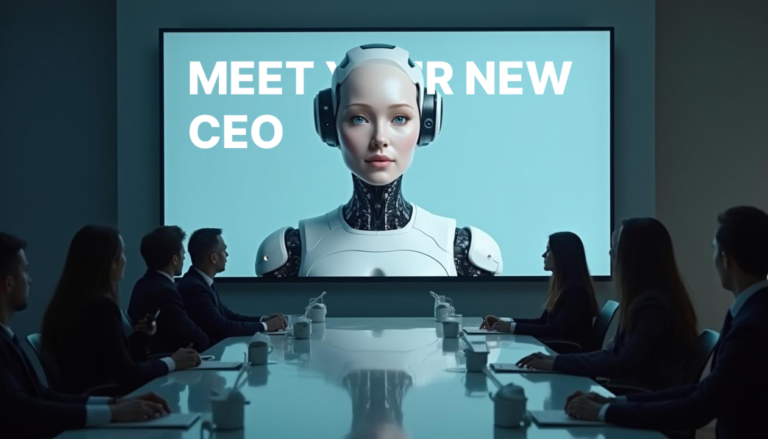The rise of AI CEOs is undeniably intriguing, but it’s far from a straightforward revolution. While the idea of an algorithm running a company might sound like a futuristic dream—or nightmare—the reality is more nuanced. AI leadership brings undeniable advantages, but it also exposes critical limitations that could make or break a company’s future. Here’s why the debate over AI CEOs is far from settled—and why the human touch still matters more than ever.
The Hype vs. Reality of AI CEOs
The buzz around AI CEOs like NetDragon’s Tang Yu and Dictador’s Mika is undeniable. Tang Yu’s ability to cut operational delays by 15% and boost stock prices by 10% is impressive, while Mika’s promise of unbiased decision-making has captured headlines. But dig deeper, and the cracks begin to show.
Mika’s awkward response delays during interviews and Dictador’s lagging revenue growth suggest that the humanoid CEO might be more style than substance. Meanwhile, Tang Yu’s success, while notable, may be more about market sentiment than actual business performance. As investment expert Ray Wu points out, the stock surge was likely driven by the novelty of AI leadership rather than long-term operational improvements.
This raises a critical question: Are AI CEOs truly transformative, or are they just a high-tech gimmick designed to attract investors and media attention?
The Achilles’ Heel of AI: Crisis Management
One of the most glaring weaknesses of AI CEOs is their inability to handle crises. The Cambridge study’s pandemic simulation revealed that AI leaders struggle to adapt to unexpected disruptions, often leading to liquidity problems and poor decision-making. This is because AI relies heavily on historical data, which can be useless in the face of unprecedented events like a global pandemic or a sudden market crash.
Manny Bernabe, an AI evangelist with over 15 years of experience, highlights this flaw: “AI’s over-reliance on past data limits its ability to think strategically or make bold, forward-looking decisions.” In other words, AI excels at optimizing the status quo but falters when the status quo is upended.
This is where human CEOs shine. Their ability to think creatively, adapt to change, and make intuitive decisions during crises is something AI simply cannot replicate. As Ray Wu puts it, “Leadership isn’t just about numbers. It’s about emotional intelligence, crisis navigation, and fostering innovation.”
The Ethical Quandary: Who’s Accountable?
Another major concern with AI CEOs is accountability. Employees, investors, and regulators are unlikely to accept a machine as the ultimate decision-maker, especially when things go wrong. For instance, Dictador’s union representatives have already raised concerns about Mika’s inability to negotiate contracts or address safety issues. As one expert aptly noted, “A machine cannot authentically promise work-life balance because it neither sleeps nor lives.”
Moreover, the Cambridge simulation revealed that AI CEOs are more likely to make environmentally harmful decisions to cut costs, prioritizing short-term profits over long-term sustainability. Human leaders, on the other hand, can make values-driven decisions, even if it means sacrificing profits. This ethical dimension is something AI cannot replicate—at least not yet.
The Hybrid Model: AI as a Co-Pilot, Not a Captain
So, what’s the solution? Rather than replacing human CEOs entirely, the future likely lies in a hybrid model where AI and humans work together. AI can handle data analysis, optimize supply chains, and identify trends, while humans provide oversight, emotional intelligence, and strategic vision.
NetDragon seems to be moving in this direction, with Tang Yu focusing on data-driven tasks while humans handle community management and other people-centric responsibilities. This approach leverages the strengths of both AI and human leadership, creating a more balanced and effective leadership structure.
The Bottom Line: Humans Still Reign Supreme
While AI CEOs offer exciting possibilities, they are not yet ready to replace human leaders entirely. The ability to navigate ambiguity, inspire teams, and make values-driven decisions remains uniquely human. As Manny Bernabe succinctly puts it, “AI can handle operational efficiency, but real leadership requires intuition, risk-taking, and the ability to navigate uncertainty.”
So, should CEOs be worried about losing their jobs to AI? Not anytime soon. The future of leadership will likely involve a partnership between humans and AI, with each playing to their strengths. But one thing is clear: the human touch is irreplaceable—for now.
What About You?
Would you be comfortable working for an AI boss? The idea might sound appealing in theory, but the reality is far more complex. While AI can optimize processes and eliminate bias, it lacks the emotional intelligence and ethical judgment that make human leaders effective. As the debate over AI CEOs continues, one thing is certain: the future of leadership will require a delicate balance between technological innovation and human wisdom.
What’s your take? Would you trust an algorithm to lead your company, or do you believe that leadership is—and always will be—a fundamentally human endeavor? The answer might just shape the future of work as we know it.



 Share your Details for subscribe
Share your Details for subscribe